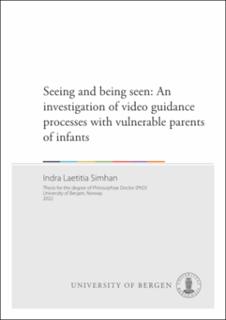Seeing and being seen: An investigation of video guidance processes with vulnerable parents of infants
Doctoral thesis

Åpne
Permanent lenke
https://hdl.handle.net/11250/2838585Utgivelsesdato
2022-01-28Metadata
Vis full innførselSamlinger
Sammendrag
The psychosocial development of infants is closely interrelated with the relationship with their caregivers, especially with the caregivers’ capacity to emotionally attune themselves to and mentalize the infants. Parents’ difficulties to mentalize and remain emotionally connected with their infants are therefore a central focus for infant mental health interventions. Marte Meo video guidance supports infant development, interaction quality, parental mentalizing and sensitivity. Yet, there is a lack of knowledge about using the method with parents thus challenged and in specialized clinical work.
The present thesis explored video guidance for parents with difficulties mentalizing and remaining emotionally connected with their infants. Which psychological and therapeutic processes were involved in the guidance? The thesis comprises two separate studies presented in Papers 1- 3. Study 1 (Paper 1) aimed to analyze how Marte Meo therapists experienced and handled challenging guidance processes with parent-infant dyads. Study 2, a cooperation with a specialized infant mental health team, investigated how parents who struggled to mentalize and remain emotionally connected with their infants experienced video guidance. Two separate analyses were presented in Papers 2 and 3. Paper 2 aimed to explore what the parents experienced as supportive and challenging elements in video guidance as a method. Paper 3 aimed to investigate the parents’ experiences of change during video guidance. Both studies were based on a phenomenological-hermeneutic approach using team based reflexive thematic analysis. Study 1 explored focus group interviews of a purposive sample of thirteen Marte Meo therapists with experience in guiding parent-infant dyads. Study 2 investigated in-depth interviews of a strategically recruited sample of twelve parents referred to specialized treatment who had difficulties mentalizing and remaining emotionally connected with their infants. Strategic recruitment by criterion sampling was based on a narrative interview with attachment-focus.
In Paper 1, four main themes were drawn from therapists’ experiences and handling of challenging guidance processes with parent-infant dyads: 1) promoting relational growth in a coercive context; 2) building an alliance that feels safe for the parents; 3) looking at positive moments in difficult lives; 4) handling intense feelings as a therapist. In Paper 2, we identified four main themes describing parents’ experiences of challenging and helpful elements in video guidance: a) handling initial feelings of fear and loss of control; b) filming as a disturbing or agentic experience; c) feeling validated or devalued in the therapeutic relationship; and d) bringing insights from video guidance into everyday life. In Paper 3, four main themes summarized parents’ experience of the change process: a) feeling inadequate or disconnected as a parent; b) discovering the infant as a relating and intentional person; c) becoming more agentic and interconnected, and d) still feeling challenged by personal mental health issues.
The overall results indicate that Marte Meo can assist profound change processes for parents with difficulties mentalizing the infants and manifest mental health problems.Video could create an opening that made parents accessible to new experiences and ideas about themselves. Feeling connected was a key ingredient for further changes in interacting, mentalizing, and feeling more confident and self-efficacious, centrally supported by the therapeutic relationship. Our findings suggest further research topics for video guidance with these vulnerable parents. Their requirements should be recognized by clinical practice and met with structural and method development. A rationale for Marte Meo in child protective contexts, cooperation with parents’ mental health treatment, therapist supervision, and expansion of training curriculum seem indicated. Early systematic assessment of parents’ vulnerabilities and child protective issues could facilitate an adapted guidance process, attending to parents’ health struggles, self-conscious emotions, and need for recognition. Our findings indicate that Marte Meo guidance can strengthen vulnerable parents’ connectedness, mentalization and self-regulation, and self-efficacy, both as parents and in other areas of life.
Består av
Paper 1: Simhan I., Veseth M., Vik K., and Hjeltnes A. (2020). Finding focus in a difficult landscape: Therapists’ Experiences with Challenging Video Guidance Processes for Parent–Infant Dyads. Infant Mental Health Journal, 41(6):743-756. The article is available at: https://hdl.handle.net/11250/2838553Paper 2: Simhan I., Vik K., Veseth M. and Hjeltnes A. (2021). Like Taking a Magnifying Glass into Everyday Life: Vulnerable Parents’ Experiences with Video Guidance in an Infant Mental Health Clinic. Frontiers in Psychology, 12:542716. The article is available at: https://hdl.handle.net/11250/2838395
Paper 3: Simhan I., Vik K., Veseth M. and Hjeltnes A. (2021). Learning to mentalize: Exploring parents’ experiences of change during video guidance in an infant mental health clinic. BMC Psychiatry, 21:400. The article is available at: https://hdl.handle.net/11250/2838549